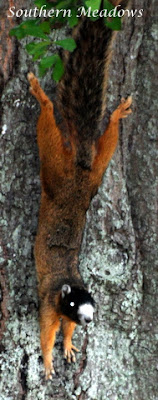An Education in Native Plants
This week I attended a Native Plant Symposium sponsored by the State Botanical Garden of Georgia and the Georgia Garden Club. I heard six speakers that shared their vast knowledge on gardening with wildflowers, trees and other native plants, landscaping and design, conservation, and gardening for wildlife. It was very informative and I came away inspired and excited to get back out in my garden and start incorporating more natives into my landscape.
Of course there were native plants for sale and of course I had to buy some! I am sure that I will blog about my purchases over the next year once they become established and I can show more of the plant than the stalks and minimal foliage that currently grace the containers.
There is one plant that I am so excited to have in my possession I will give you a little preview now. Why you ask? Well, it is a native plant to Georgia which is listed as threatened. It is the Georgia Aster 'Symphotrichum georgianum'.
This is a perennial herb native to Georgia, Alabama, North and South Carolina. These flowers require cross pollination in order to set seed so I purchased two plants. It is differentiated from the other late blooming asters by its dark purple flowers and white centers.
There are only 30 populations of these plants that have been observed in Georgia but only 15 of these small populations have survived. Eight of them are in State or National Forest lands. Habitats have been destroyed from the use of herbicides along roadsides, the invasion of non-native invasive plants and development.
The Georgia Aster is threatened and is a candidate to be federally protected so I was issued a certificate showing that the species I purchased was collected legally.
There is one plant that I am so excited to have in my possession I will give you a little preview now. Why you ask? Well, it is a native plant to Georgia which is listed as threatened. It is the Georgia Aster 'Symphotrichum georgianum'.
Photo credit: Georgia DNR Wildlife Resources
This is a perennial herb native to Georgia, Alabama, North and South Carolina. These flowers require cross pollination in order to set seed so I purchased two plants. It is differentiated from the other late blooming asters by its dark purple flowers and white centers.
There are only 30 populations of these plants that have been observed in Georgia but only 15 of these small populations have survived. Eight of them are in State or National Forest lands. Habitats have been destroyed from the use of herbicides along roadsides, the invasion of non-native invasive plants and development.
The Georgia Aster is threatened and is a candidate to be federally protected so I was issued a certificate showing that the species I purchased was collected legally.
This is just a taste of what I am going to get as I have enrolled in a certification program in native plants from the State Botanical Garden of Georgia. It is a knowledge based, field directed program which requires 80 hours of course work, electives, field trips and volunteer service to complete. My first class starts tomorrow and covers winter tree identification; something I admit I could use some extra study in. Stay tuned...


.png)
